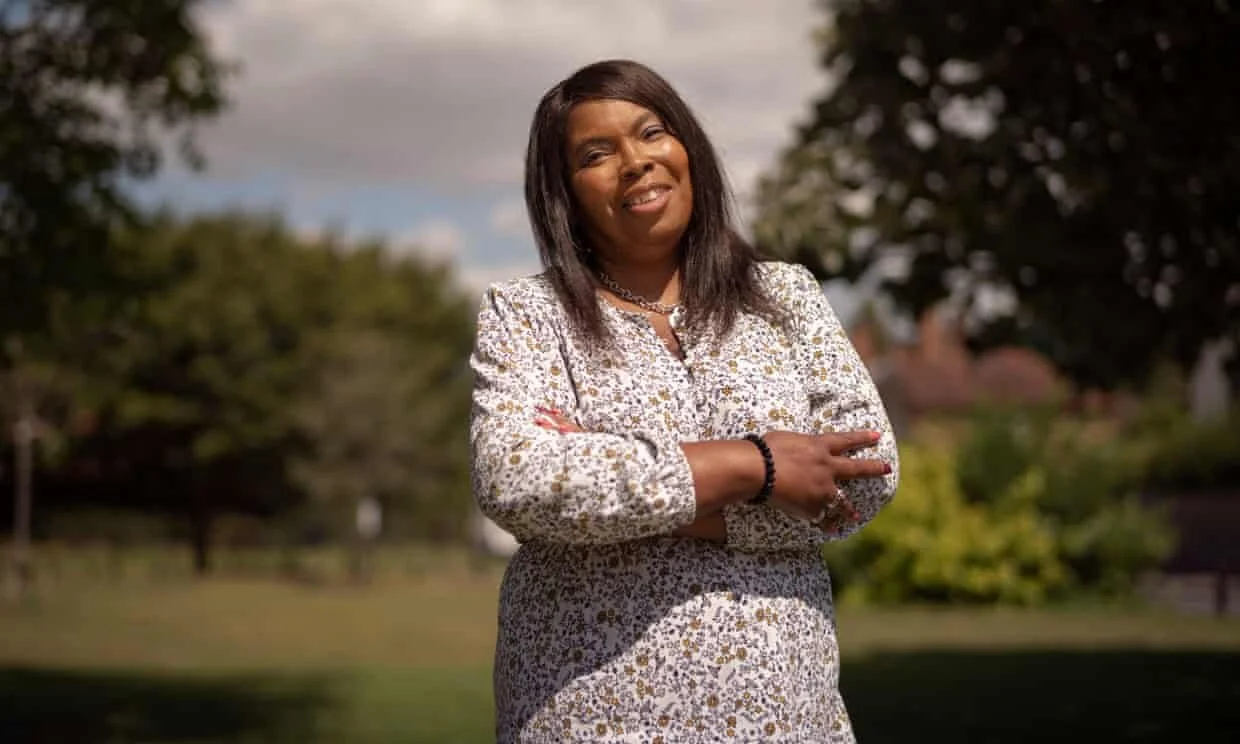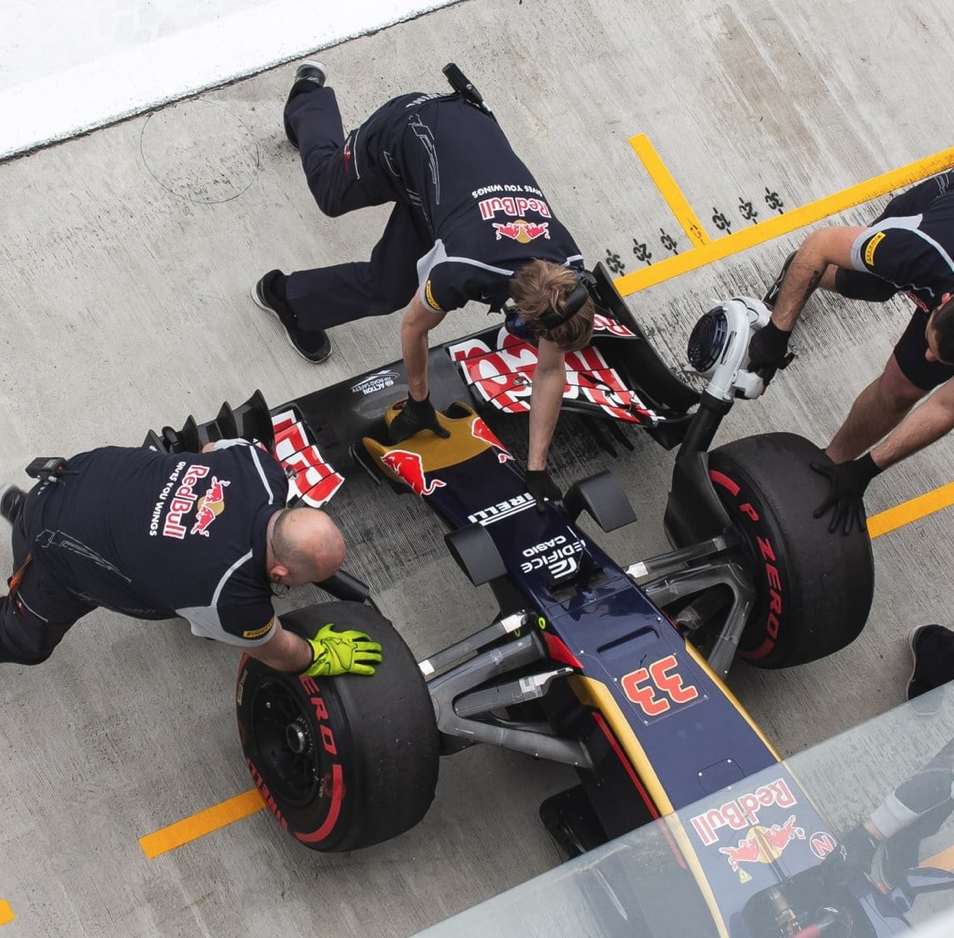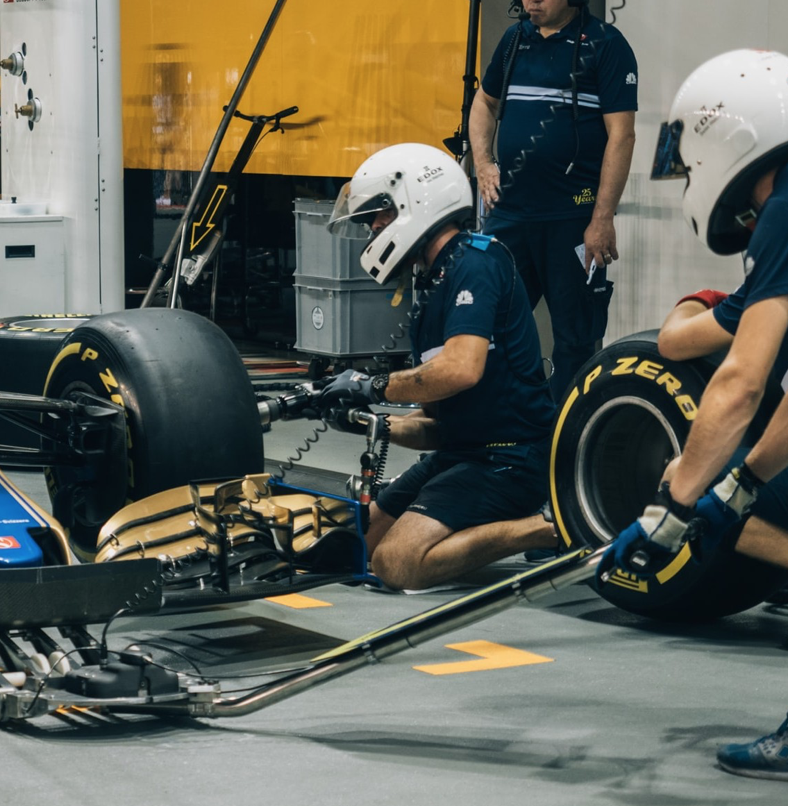Representing race at the track; a challenge for motorsports and the black female race official who wants to smash through those ceilings!
by Somya Iqbal
_____________________________
SOMYA IQBAL
Tuesday afternoon and onto another zoom call I go. I go through the motions; getting the link up, fixing my hair, making sure there are no alarming items in the background (aside from my housemate James who was making pasta in the background), but this call was unlike my usual. This time I have the unique opportunity to speak with the awesome Carol Glenn - A motorsports legend who is not only the first black female race official in the UK but she is now also the founder of the amazing NRG - Next Racing Generation academy, a new organisation that aims to tackle the lack of racial diversity and representation in motorsports and providing much needed space and mentoring for young people in the sport. A true force to be reckoned with, Carol left me inspired and enthused about motorsports and all that it entails and I’m willing to bet that she’ll do the same for you too!
_____________________________
I’m met with a huge smile on my screen from Carol (based in sunny Wycombe) who is seated in front of an image of the recent F1 world champ Lewis Hamilton. As soon as I told her that I am based in Scotland, she tells me of her love and appreciation for this place having visited many times to race tracks here. This is a woman that knows every race track in the UK like the back of her hand! So what does Carol’s day to day role entail? A good place to start…
SI: So you’re a race official here in the UK and have been working in the motorsport industry for the past 30 years. Our readers would love to know a little about your role, what does your day look like as a race official?
CG: “My current role is clerk of the course. Someone who sits in race control with other clerks, and my role is operations clerk. I get in for the morning, check that the timetable is correct, make sure everything is in place, I do a pre track inspection, to make sure the track is ready before the stewards go out for inspections. When it is 9 o clock, I give the command for the green lights to go, so that cars can go into the pit lane for qualifying. If there is an incident, I get to call for a red flag or safety car, and at the start of the race I go to the gantry and do the countdown to start the race , whether it is a stand start or run start.”
Carol reminds me that over the past 30 years, her positions have mostly been voluntary. She started off as a track marshal (the people in white or orange overalls at the races) “so I used to be on the post, learned how to wave a flag, if a car came off, I learned how to push it, I learned how to get drivers out, I learned how to sweep the track, all of that”. From there Carol progressed onto sector of the meeting which was much more administrative role. “If a driver has done a misdemeanour, the report comes back to us, and we have a chat with him. If he has transgressed I can give him a fine or verbal, it is like a mini court but they also have the right to appeal to the stewards if they think you have been unfair.” And this is all completed in a day’s work, since races occur on the weekend, so you have a one or two day meet and everything needs to be completed in one day!
SI: Have you had anyone question your judgment in one of these things?
CG: “Drivers are funny things, when they’ve got their helmets on and the red mist comes up, you can interview two drivers about an incident and they will both tell you something different, because it’s from their perspective, but nowadays, it is slightly easier to do judicials, because cameras are attached to the cars and most circuits have got CCTV cameras, so I can check footage before interviewing them, and when they see there was a yellow flag or red flag, or cut across somebody, then the story can change, I’ve heard every single excuse that a driver can come up with”.
SI: Have you had any instances or excuses from drivers that have made you laugh?
“It’s almost like the dog ate my homework, you get the ones that are like , it wasn’t me, I saw the lights, I hit the brakes, it was him.”
The role seems to have as much interaction with people as it does engaging with vehicles. I wanted to ask Carol, what the draw was for her to remain in the field for so long and what her highlights were. Suddenly her face lights up as she speaks about the feel and experience of some of the events she has been involved in as a Marshal and as a guest:
CG: “The highlights are from back in the early days, when I was still a marshal…, and I developed my love for endurance racing, I used to go to Le Mans every year, both as a guest and marshal, and it is a race meeting that you can’t describe, you have to do it to see.
Le Mans 24 hour race
“To be up for 24 hrs with little or no sleep, listening to brilliant cars going around the circuit, especially when you are marshalling them, in the middle of the night you can tell what car is coming down by the sound, you get to know the different sounds of each car, it is a magical experience, one of my favourite, favourite, favourite events.”
_____________________________
That’s favourite, three times people! The second highlight is one that sounds like a movie scene, sunny weather, fabulous outfits, and race cars:
“Another highlight was the first time I went to Monaco for the Historic Grand Prix which happens 2 weeks before the main Grand Prix every other year… and that was a magical experience. Just to be in the pits where the formula one cars normally go, wandering around , you actually dress up, because everyone in Monaco is so beautiful, so you parade around in your hat and you look gorgeous”.
SI: Have you ever been a race driver and gotten behind the wheel yourself?
“When I first started, I wanted to become a racing driver and it was what I wanted to do, and as the years went on, and very quickly, I realised I had not actually done it…I would like to be in a serious race one day, but I’ve been lucky, what’s helped my passion is that I’ve had the chance to drive course cars around the English race circuit, and I’ve driven a pace car during a demonstration, where you have to be the last car or first car. I’ve also been a passenger in a pace car and been driven around the circuit by professionals as well at absolute speed. That has satiated my enthusiasm a little bit.”
SI: When I think of motorsports and watch it on TV, it seems like the cars become an extension of the drivers bodies. It looks like an amazing experience. What does racing or being involved in racing feel like for you? It all sounds so exhilarating to be a part of!
CG: “My friends and family sometimes ask me: ‘You are not a driver, so what is it’? You cannot describe that feeling. One of my favourite circuits is Brands Hatch, and coming out of that pit exit you have a steep bend, and come up to a tight curve, that is really exhilarating, doing that and getting it right. About racing, it is about being one with the car, knowing what your car can do, understanding what the camber of the track is doing, people think you need to put your foot down and go, but it is about all the different things, the different elements coming together.”
SI: Let’s talk a little about the industry itself, what are some of the challenges that the industry is facing right now?
CG: “One of the main challenges the industry is facing is definitely it’s lack of diversity…When I first started in motorsport 30 years ago, it was a focus on women, women marshals, and women drivers were far and few, and there’s been a lot done over the years, and it’s not brilliant but much better, there are more females marshals, stewards and racers. But what you don’t see still is people of colour, you can count on one hand how many POC are there as officials”.
SI: It feels like a case of whatever boxes are easier to tick and feel convenient at the time right? So that brings me to the next question, what do you envisage for effective outreach, in order to get more people involved?
CG: “I feel that we need to make motorsport obtainable to youngsters, the kids out on the street, make motorsport interesting. See it as an alternative way for getting experience for their CV…some volunteering opportunities, and knowing that these exist and that through those they will get taught all sorts of things, key skills that could help them in their day job, you do not need to like motorsports for that, but it helps! Bring motorsports to the school and explain to them that it is a career path, ,which is something that I am working on. I’m not necessarily just looking for the next Lewis Hamilton or Rossi, but there are different levels of competition, club sports, you can also become a mechanic, a designer, someone in the hospitality industry around motorsport, you can be working as a commentator - There is a whole plethora of positions that people do not realise are there, and are not pushed at a career level through schools.”
Here is where Carol’s excitement and passion really come through. Carol explained just how rounded the approach needs to be when engaging with young people. This was reminiscent of the brilliant Brittany Young based in the US who has set up a scheme to work with young people through dirt bike riding and STEM subjects. Check out the VC interview with Brittany here: http://www.vclondon.co.uk/blog/riding-for-change-brittany-young-of-b360-balitmore
SI: One of the overarching barriers that people face is the cost of pursuing extra curriculars or careers in an expensive sport like this, similarly in other areas, like say, music where POC are underrepresented, or other STEM subjects. How do you see the industry changing and adapting to bridge this gap?
CG: “I think that teachers and careers people need educating, you might have little Johnny or Claire who have come from a more diverse background, and might not be as talented as a 10 A* student but they still have passion and want to do something, and they might tell their teacher, that I want to be a * insert ambition here* but the teachers might respond with , why don’t you go and do this instead and they dumb down that persons ideas and thoughts…you need a strong parent, not pushy, but those who ask, ‘my little Johnny or Claire wants to be an astronaut, how does he /she become one? What extra lessons do we need to get? What do I need to do to get him there?’ Your child might not become an astronaut but they might become the person that designs the part for the spacecraft, and if they have the dream of being an astronaut, you just need to get them onto the right path which could then lead into so many jobs in that field. Parents need to know when to push and when to pull back, how to get their child interested. They need role models, that’s why we need to have people they can see and relate to. That’s why young people want to be footballers, there are a lot of black professional players, so they can relate and they have their heroes there to see. In other sports, they haven’t got those same heroes, apart from Lewis Hamilton and those at the top. That can seem unattainable its important that they can see others at every level, who speak like them, and act them.”
CAROL GLENN
SI: In terms of the cost of entering such a field, it remains to be seen. As far as you know, does the industry provide scholarship schemes or do they collaborate with schools?
CG: “Not necessarily and you have to be in the know. I have got a cohort of 15 parents who I have been talking to, and they have their kids in karting and some of them have been in karting for years, they’ve spent £1000s. They’ve used teams to help run their children… but the parents will not know to ask , what tyres are you putting on my child’s kart, or what setup are you doing for my child, it is about knowing which questions to ask. That’s the myth I want to take out and understanding that. There are scholarships but I’m not sure how genuine they are.…There’s still a lot of very entry level things you can do before you get to paying a lot of money, so it isn’t cheap but it can be made more affordable.”
SI: Personally, I would like to get into dirt bike racing and maybe even stunt riding one day. However, I am a petite, ethnically Kashmiri woman, and trying to enter spaces which are not typically designed for women. It is something I definitely grapple with. Particularly in motorsports, due to the ingrained idea that you need to be physically equipped and generally larger to deal with the challenges it brings. Have you had any similar experiences in your career?
CG:“I haven’t had the same experiences exactly as I’m a different individual but drivers, female drivers have had things like, you are not strong enough, you couldn’t handle a formula 1 car, you couldn’t do this, yaade yaadee yah, but at the end of the day, all the same things we hear. If you want to get into something and are serious about it you’ll put the work in, you’ll get fit, the hand eye coordination, you’ll do exactly the same things! You’ll practice your neck muscles, weight training for your neck, all of those things, you’ll get your safety clothes on. There really is no barrier.
_____________________________
“If you feel you can do it, even though people might put obstacles in your way, I always say, let me have a go, if I show I cannot do it, that’s fine, but don’t just go , STOP you can’t do that. I always say to people. Have a go. You don’t know till you have a go.
_____________________________
So for those who are not familiar with what an all encompassing term “motorsports” can be and what kind of range it has, Carol was able to shed some light : “Motorsports is literally anything with an engine. Two wheels, four wheels, auto solos, sprints, hill climbs, rallying, rally cross, cars from karting, and drifting. There are lots of grassroots little race clubs that tend to have small meets, weekly trials, you can get involved with to start you out if you’d like to give it a go. From car trials to Land Rovers or buggies and dunes, there is a whole plethora of things you can do”. Her best advice for those wanting to get started was to “Google, find your local motor club. Ißf you live near a circuit, ask nicely and they might do a taster day for you, or organising clubs like BRSCC, 750 Motor Club, (those are for cars), they’ll do taster days, rally clubs all around the country. You’ve also got karting clubs where you can have taster days and have a look around. More importantly, come to NRG motorsport and we will show you how to go about it!”
SI: That’s the perfect segue to asking about your recently launched NRG (short for New Racing Generation) motorsports academy in collaboration with Red Bull! Can you tell us some more about it and what you hope to achieve?
CG: “The idea for NRG motorsport was initially born from the lack of diversity in the motorsport world. We have a corporate side and a charity side , where the charity side will deal with education for young people and their parents all about the world of motorsport from driver training, tuition and all things driver track to online training, lessons (right now we’re doing things via zoom because of the way things are for now) on black history to physical and mental training to dealing with mental blocks in performance. We also get all kinds of people from different industries to talk to them about their experiences and how they’ve dealt with racism and unconscious bias. We find that when kids will leave school and haven’t had that coaching , or if their parents haven’t been able to give them that training, they won’t know how to deal with the knockbacks or knowing how to identify if somebody is biased or racist to them.We hope to help them to know the difference, to know when to push forward and when not to push forward.
THE NRG ACADEMY
On the track, we have all of our kit for use, we will be starting to have drivers who we help to get on the track and race, we help manage their day, make sure they’re doing their nutrition, make sure their physical training is right, through to giving them media training. Everything they could possibly need help with to get ahead in this industry.
SI: with respect to coming up with the idea, you said it was due to a lack of diversity in your field. Did you get up one morning and think, “right! I am going to tackle this myself”?
“After BLM and Lewis Hamilton speaking out in 2020, I found that it finally gave me the courage to also speak out about my own experiences in my industry. I had never had the opportunity to speak out about everything I have experienced (although on the whole I have had many good experiences in motorsports). After sharing my story I also wanted to start thinking of solutions. Around the same time I ended up on a zoom call with 15 parents who had similar experiences in karting and that’s where the idea for NRG came from”.
_____________________________
NRG literally aims "To take young ambitious people in particular those from diverse groups, from conception through to the pinnacle of Motorsport.”
_____________________________
Representation is also at the forefront of Carol’s mind at NRG. “I want to make sure there are people within the NRG team that represent the kids themselves so they can have those positive mentors around”. Theres no doubt that Carol really is utterly passionate about what the future can hold for young people given the right advice and training, in the world of motorsports at all levels and job roles.
SI: So what is in the pipeline for the early days of the NRG academy?
CG: “In early July we’re teaming up with Red Bull to present an over 16’s event where we’ll have tons of info about how to get into motorsports along with some driver simulators. Anyone can come along and you can simply sign up on the website to attend.”
SI: So how will NRG more some of their in real life race events more approachable for would be motorsport fans and participants?
CG: “Before, we could wander around the paddock on a Wednesday evening, what I call the good old times, and we could chat to the drivers and get inspired. Now you don’t get any access and that’s a shame”
_____________________________
“As part of NRG, if you want to come to races and watch, there’d be access to the paddock, even If you are interested in say the corporate hospitality side of motorsport, you can come down and get inspired and be a part of that. You can talk to our drivers, you can become a member and come down and feel special, and be in the bits you wouldn’t normally get into. It’s all about the experience. This is for adults too, as well as the kids.”
_____________________________
On the topic of launching NRG this year and what it all entails, Carol spoke about what it means for her personally. “I know it is multifaceted and maybe people think it’s a lot to take on- to launch an academy, but if you don’t make a start, nothing will ever change, so even if I achieve half of what I set out to do with NRG, for me that will be a legacy which will remain long after I’m gone. In between that, I am still wanting to achieve my own personal goals, I will still be out on the circuits with my work seeing how far I can get. There are very few senior female international stewards or stewards of colour, so I want to smash that ceiling as far as I can.”
Carol’s inspiring attitude is exactly what is required to get things off the ground. This is a woman who whilst maintaining a sense of her own goals and wishes has found a way to give back to a sport and careers that she clearly adores.
CG: “I just want to make sure that when you come down to the racing paddock, it is not one dimensional, it has come colour on it!”










